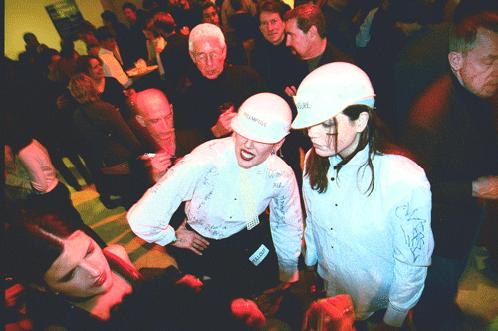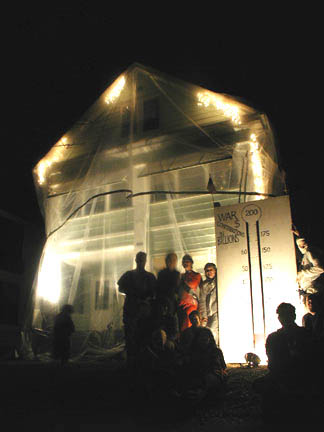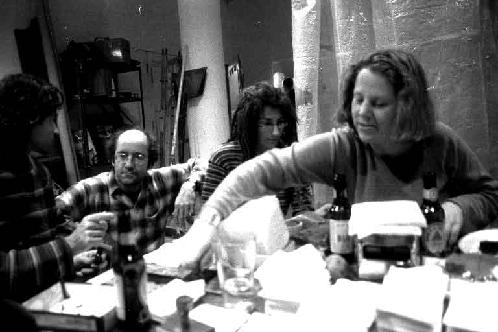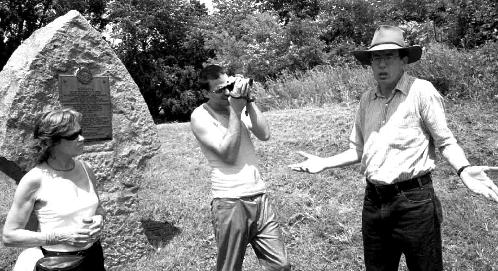Playing on the Barricades: The Twin Cities Artist Front
The final feature in our "Art and Politics" focus, this profile of the Twin Cities Artist Front takes us all the way to where politics is made: precinct caucuses. Go and be heard!




The Twin Cities Artist Front could have as its motto William Carlos
Williams’s line “No ideas but in things.” As artists, they seem to
instinctively know that ideas are changed by passing through
materials. Their actions and constructions happen on the sites of
ideas but aren’t illustrations of them. Because ideas are finally
always about things, these actions are embodiments of ideas–and we
know bodies are changed by time and circumstance.
In accord with this, most of their pieces have been public actions
that are co-created by their audience, who are their collaborators to
greater and lesser extents. Most recently, for instance, TCAF did an
action at the closing party for the Walker Art Center.
TCAF members David Pitman, Steven Rife, Nathaniel Kuster, Chanel Tattenbach, Jane
Powers, Jan Elfman, Beth Van Dam, Francisca de Buerges Rosenthal, and
Mary P, donned hard hats and stiff-fronted tuxedo shirts (I can’t
imagine a better Power Dress than this). The hats had single words printed on them–like Censure, Oil, Trillion, Pull-out, Herzog, De
Mueron, etc.–and the people wearing them were armed with Sharpie
markers. (To me this implies both permanence and vandalism. In early 1980s punk San Francisco I knew a guy named Marksalot who inscribed much of the
public city with Sharpies.) They invited patrons to write their responses to the words on their white shirts. The action wasn’t sponsored by the Walker; it was all TCAF, using the Walker event as a site.
The action was one of the few that retained the notion of open-ended transformation invented by the modernist practice that the Walker sets in stone. (Weird idea, anyway, a museum of the radically new—sort of like Lenin in his mausoleum, still a pinkcheeked revolutionary in a box even while his historical persona, old in sin, reveals year by year its
bones of unadulterated power. Can a museum ever be anything but a shrine to the well-established? These are the kinds of questions that this action tends to evoke in me, at least.)
But TCAF founder Mark Wojahn takes a sunnier view of these things—he
emphasized the role of humor in TCAF actions: “Laughter and play are
important parts of the group, ” he noted. “We work on important and serious issues, but if we’re not enjoying it, what good will it do?”
Here again, the lived qualities of the embodiment of ideas are seen as crucial to their integrity. Everything is test-driven in the body, not merely head-music.
Wojahn spoke also of the role that TCAF plays in mutual support—that members of the group care for each other’s work and careers. He spoke of writing a review for Rain Taxi of the book of Marcel Duchamp’s letters titled Affectionately, Marcel-—how solicitous Duchamp was about his friends, his fellow artists, and how he invested in himself by investing himself in these friendships. There was a great deal of mutual support, Wojahn notes, in the careers of the great modernists familiar to us today.
So one major role of the Twin Cities Artists Front is being a supporting context in which members can live, work, share ideas, help each other. Another role is to affect the world by affecting the community in which the members live: the Twin Cities. Their list of projects is long, and is well documented on the group’s website on mnartists (see the link below). Each project is led by an individual member, but everyone helps to create it.
I’ll just touch on a few of them here; the voice describing them is largely Mark Wojahn’s. See the website for fuller documentation:
Duct and Cover . . . Mark Wojahn with David Pitman/Jean Humke. David provided the sketch and model for the housewrap, a response to Bush’s “homeland security” measure of duct-taping windows. TCAF members got together in an underground parking garage and cut the plastic pieces; then we all assembled the wrap. It was taken out by the wind after about a week and a half, but gained a lot of media attention.
Napkin Project I believe it was Olsa Kuster who had the idea for the Napkin project. This was the first of the TCAF actions. We were all in shock after the terror attacks of 9/11. The napkin project was a gentle way we could contribute something that was soft and gentle. Intended literally to wipe up spills, it was our thought- provoking solution to a messy world. We provided napkins and rubber stamps with imagery and text; the napkins turned up all over the world, as far away as Berlin.
The Game at the Black Dog Cafe This was derived from the the Surrealist game called “Definitions, or questions and answers.” This is a game we ritually play to conclude each meeting. One person writes an answer on a slip of paper and folds it; another person writes a question on the outside.
Dogleg in a Dog Cart to Chief Black Dog Diversions . . . Nathaniel Kuster became our official tour guide, bent on informing
us of all things Black Dog. We left the TCAF “Shadows” exhibit at the Black Dog Cafe in Lowertown by motorhome, and searched through the Minnesota River Valley to find historical Chief Black Dog sites.
Bush Dies in Iraq . . . .Steven Rife noticed a newspaper headline which read differently because of a crease in it: “Bush Dines in Iraq” became “Bush Dies in Iraq.” So he proceeded along the street to all the newspaper boxes, and put the crease in the front page that produced that reading.
Many other projects have been done; see the website for more.
The group is loosely organized, without membership per se. Wojahn described it this way: “The TCAF is a group of artists doing our own work, and interested in doing political work as a group. We meet at each others’ homes every other week or so; it’s our friendship that’s important.” Their collaboration tends to be thorough enough so that the authorship of each particular event can become ambiguous. Everyone seems invested in what the group brings about.
To contact the TCAF, email xlart@copper.net. Keep your eyes open for their next action. They will be encouraging the masses to attend their local democratic caucuses on Tuesday March 2nd. See below for the link the TCAF has provided to your caucus location.
Photos courtesy TCAF. As always, click on them to enlarge.